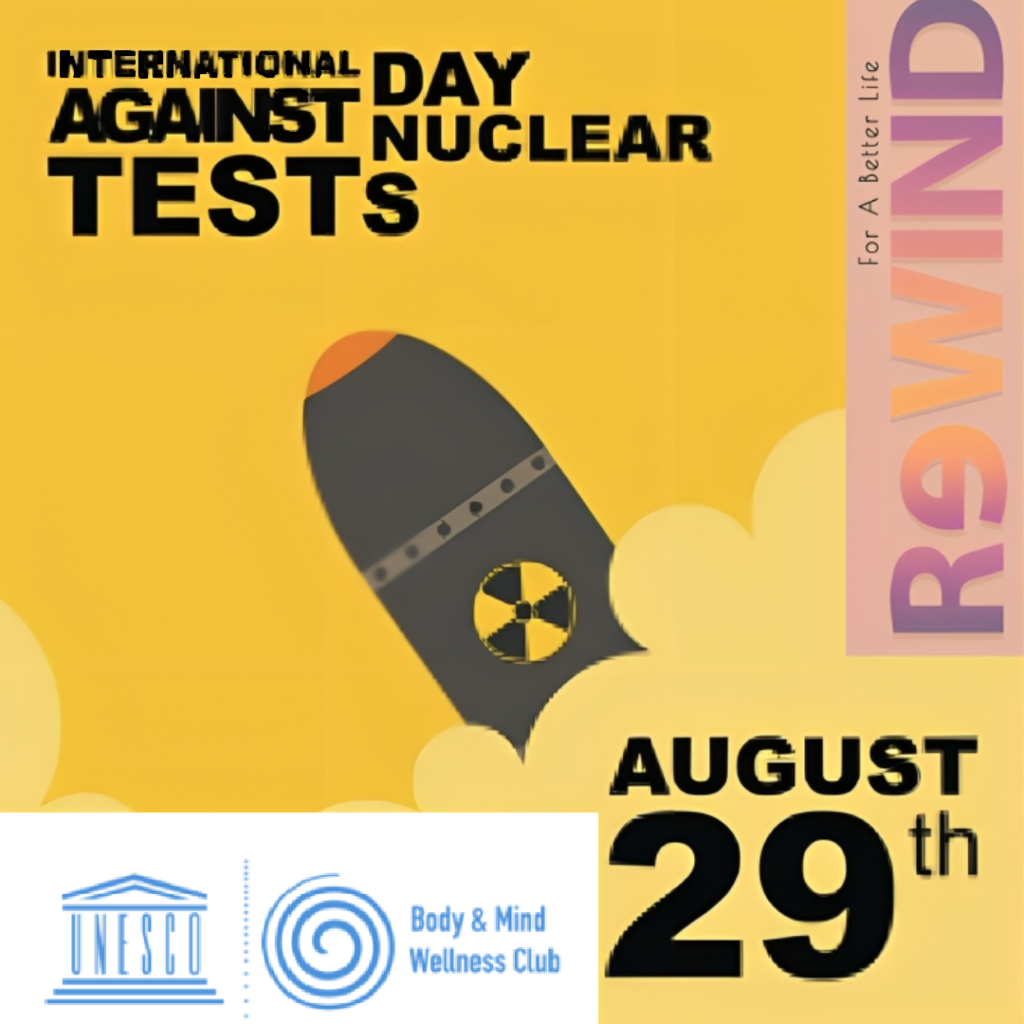
The Origin
The origins of the International Day Against Nuclear Tests date back to World War II (1939-1945), when the first atomic bomb was developed by the United States under the Manhattan Project in Los Alamos, New Mexico. The first uranium weapon, “Little Boy,” was detonated in August 1945 above Hiroshima, Japan, followed shortly by the plutonium-based “Fat Man” over Nagasaki. Following World War II, nuclear technology spread rapidly as nations sought military power, prestige, and scientific progress. This led to the proliferation of nuclear weapons, primarily driven by the US and the Soviet Union during the Cold War, resulting in a significant increase in nuclear arsenals worldwide.
The Treaty to End the Possibility of a Nuclear War
The Treaty on the Non-Proliferation of Nuclear Weapons (NPT) of 1968 came about due to the need to promote global peace and security cooperation and the gruesome impact that nuclear detonation has on the natural ecology. In a bid for peace, both nuclear and non-nuclear states ratified the NPT. Subsequently, on the 29th of August 2009, at the United Nations General Assembly (64th session), the International Day Against Nuclear Tests was established. The 29th of August also marks the day when the Soviet Union’s nuclear test site was closed.
One Voice to End This Destructive Legacy
Comprehensive Nuclear-Test-Ban Treaty (CTBT) of 1996 aims to end all nuclear testing, yet it has not entered into force. The CTBT serves both disarmament and non-proliferation by preventing the development of advanced nuclear weapons and acting as a barrier against states seeking to violate non-proliferation commitments. The Secretary-General’s disarmament agenda, “Securing our Common Future,” emphasizes the importance of the CTBT in halting the arms race and urges remaining states to sign and ratify the Treaty promptly.
The Stakes and How You Can Help
A nuclear war could devastate over half of the world’s population, causing immediate deaths from explosions and subsequent fatalities from environmental and health catastrophes. The aftermath would see global temperatures plummet, crops fail, and widespread famine. Radioactive fallout would contaminate air and water, leading to respiratory diseases and massive loss of life, essentially collapsing life as we know it. On August 29, the International Day Against Nuclear Tests, individuals can take action by starting awareness campaigns, lobbying governments, or advocating for the ratification of treaties against nuclear testing. Social media and grassroots initiatives can play a significant role in this fight. Additionally, the International Atomic Energy Agency (IAEA) supports the peaceful use of nuclear energy, contributing to energy security, human health, food security, water management, and industrial applications, helping Member States achieve their Sustainable Development Goals (SDGs).
UNESCO BMW’s Involvement
UNESCO BMW is committed to preserving and highlighting organizations investing in climate change education. Their efforts aim to engage journalists who tell environmental impact stories, especially in the context of the International Day Against Nuclear Tests. This involvement aligns with UNESCO BMW’s mission to promote equity, inclusion, and environmental preservation. By encouraging eco-friendly practices, ecosystem protection, and sustainable business approaches, they contribute to a greener and safer future. Through initiatives like the UNESCO Body & Mind Wellness Club, they inspire individuals to express themselves through arts, culture, and nature activities. Programs like “Adopt a Road” and ecology volunteering raise environmental awareness, and activities such as mindfulness meditation and wellness practices enhance inner peace and well-being.
UNESCO BMW’s Vision
Our vision mission aligns with the UN’s mission to promote equity, inclusion, and environmental preservation, especially for vulnerable and marginalized peoples. They aim to create a sustainable future by fostering diversity, inclusion, and equity through programs like the UNESCO Body & Mind Wellness Club, which encourages self-expression through arts, culture, music performances, art workshops, and nature activities. UNESCO BMW highlights the importance of sports in promoting peace and unity. Their new program, ReWIND, fosters mindfulness and inner peace through meditation routines, emotional intelligence workshops, and mental peace exercises, striving to create a harmonious and environmentally conscious world that preserves cultural and artistic heritage, respects Mother Earth, and advocates for a nuclear-free world.
By:- Kiwalabye Gerald
Sources:
- Treaty on the Non-Proliferation of Nuclear Weapons (NPT) | IAEA
- https://www.britannica.com/technology/atomic-bomb
- https://www.atomicarchive.com/history/coldwar
- https://bio.libretexts.org/Bookshelves/Ecology
- https://history.state.gov/milestones/1961-1968/npt
- https://www.un.org/en/observances/end-nuclear-tests-day
- Bombing of Hiroshima and Nagasaki – Causes, Impact & Deaths